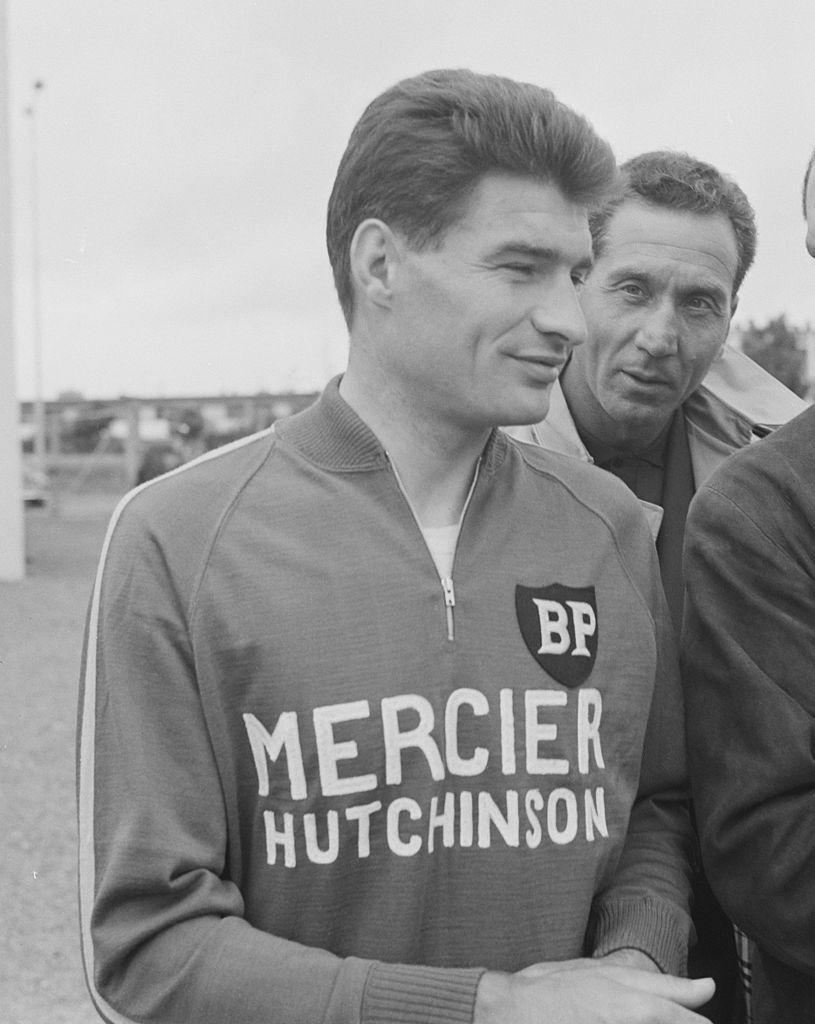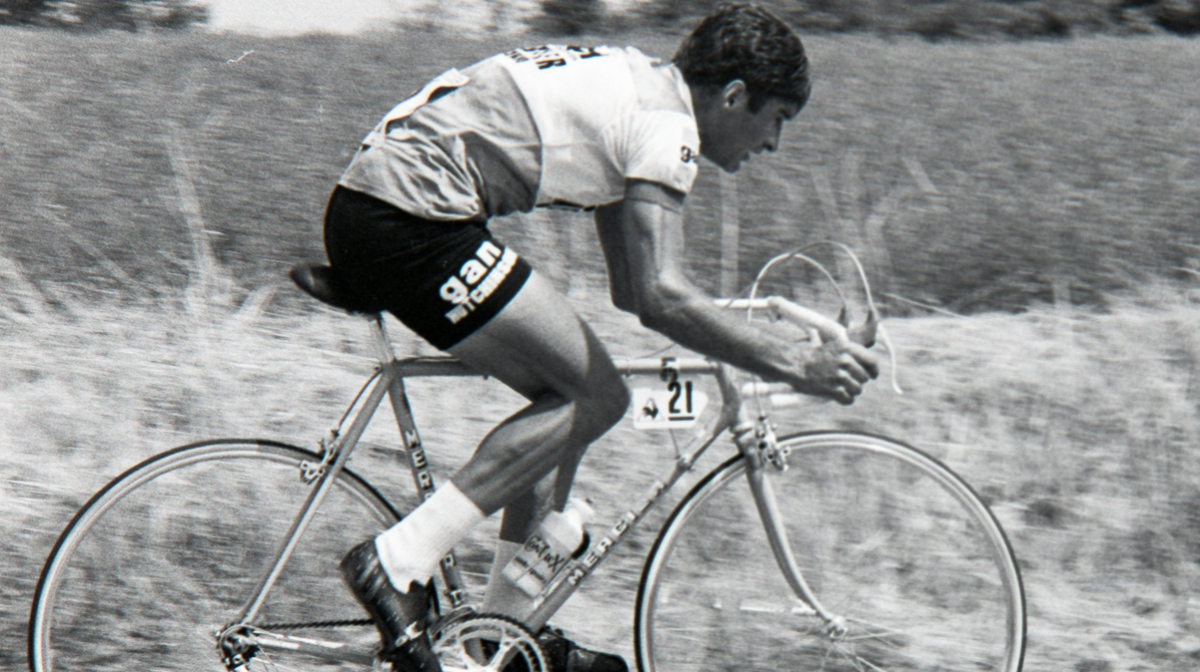The Tour de France in the 1960s belonged to Jacques Anquetil. Monsieur Chrono, a nickname easily bestowed upon someone with such prowess in the individual time trial, powered his way to four consecutive Tour de France victories between 1961 and 1964 having already picked up la Grande Boucle at his first attempt in 1957 aged just 23. Indeed, Anquetil’s benchmark of 5 Tours de France has yet to be surpassed with his contemporaries only ever managing to equal this achievement. Yet, in spite of such a stranglehold over the world’s biggest bike race, Anquetil did not have the hearts of the French public. These hearts each July belonged instead to Raymond Poulidor – the Eternal Second.

1. Raymond Poulidor at the 1966 Tour de France.
Born in the farming heartland of central France, Poulidor was shaped by his agricultural heritage and would refer to this hard upbringing throughout his career. Poupou, as he became affectionately known, often struggled to balance training with his farm work frequently riding through the night for training and forced to miss races later in the year as bringing in the harvest took precedence. This all changed in 1959 when he was picked up by the Mercier-BP-Hutchinson professional racing team as a direct rival for Jacques Anquetil who was already well on the way to the height of his powers.
Anquetil vs Poulidor: a rivalry for the ages
There is no doubting the talent of Raymond Poulidor with his palmarés littered with victories in the biggest races, most notably the Vuleta a Espana in 1964 and his breakthrough victory at the 1961 Milan-San Remo, but it is for his record in his home grand tour that he is most infamous.
Between 1962 and 1976 Poulidor finished the Tour de France 12 times only finishing outside the top 10 once and finishing on the podium an agonising 8 times; 2nd on three occasions and 3rd another five times by the time the race reached Paris. To add insult to this injustice and in the face of such astonishing consistency, Poulidor never once pulled on the most sought after jersey in cycling, the Tour de France’s maillot jaune.

2. Raymond Poulidor at the 1976 Tour de France
Perhaps Poulidor was simply born in the wrong era, a golden era for cycling with Eddy Merckx, Felice Gimondi and Federico Bahamontes to name but three titans of the sport whose own careers were intertwined with that of the seemingly star-crossed Frenchman. It is Jacques Anquetil however who stands out amongst this pantheon of cycling as the one rider who dogged the wheel tracks of Poulidor most persistently and it is this rivalry through the early 1960s that would earn Poulidor the love of the French public and his notoriety as the man that never won the Tour de France.
Anquetil and Poulidor are the epitome of opposites attracting with not only their markedly different fortunes at the Tour de France highlighting their rivalry. Anquetil pedalled with an incomparable fluidity once described as a “perfection most riders spend a lifetime searching for” that translated into his off-bike demeanour. Slicked back blonde hair coupled with his playboy, headline-grabbing lifestyle and sharp northern French accent could not have cut a more stark contrast to the humble farmer Poulidor whose weathered, deeply tanned visage and clumsy speech marked out his simpler upbringing.
It was this simplicity of character that truly resonated with the French public and each time Anquetil triumphed over Poulidor it only helped to solidify his popularity throughout the country. This was no more keenly felt at the 1964 Tour de France on the Puy de Dome.
Puy de Dome: a rivalry encapsulated
Having been bested the two previous years at the Tour de France, Poulidor headed into the 1964 Tour de France having already won the Vuelta a Espana earlier that year and arguably with the best form of his career. The pair were inseparable until the stage 17 time trial where Anquetil took the yellow jersey but with Poulidor only 56 seconds behind and with a stage made for Poulidor, a mountain finish at Puy de Dome, looming this was the once chance for Poupou to make his mark on the Tour de France.
This stage produced perhaps the iconic cycling image of the 1960s with the pair battling for every inch of the road often touching shoulders and elbows as they weaved exhausted up the climb. With several hundred metres to the line, Anquetil finally cracked and Poulidor pressed on to the finish alone. Once again, Poulidor was to play second fiddle to his fellow countryman and could only cut Anquetil’s lead to 14 seconds missing out on the yellow jersey. Poulidor would remain in second place all the way to Paris.
Some things aren’t meant to be
Raymond Poulidor retired in 1976 having once again made the podium of the Tour de France this time finishing 3rd behind the greatest rider of all time Eddy Merckx. He openly concedes that the biggest handicap in his career was Jacques Anquetil whose prodigious athletic ability and voracious appetite for victory made him almost impossible to resist. Poulidor also acknowledges he perhaps lacked a true ambition to win. In a 1992 interview, Poulidor admitted he never dreamed of winning prior to a race and that for him the experience of being a professional cyclist compared to his farming childhood was already enough of a victory.
Perhaps of some consolation to Poulidor are the respective achievements of both his son-in-law and grandson Adri and Mathieu van der Poel who were both world cyclo-cross champions. Mathieu van der Poel in particular is perhaps one of the most exciting cyclists of the current generation and at 19 years of age was the youngest every cyclo-cross world champion in 2015. Poulidor now works in a public relations role for the Tour organisers and is as beloved by the French public as he was in the 1960s when he earned his reputation as the Bridesmaid of theTour de France.
View our Tour de France offers on team kit, leader’s jerseys, and more.
1. By Eric Koch (ANeFo) – GaHetNa (Nationaal Archief NL), CC BY-SA 3.0, https://commons.wikimedia.org/w/index.php?curid=43402487
2. By BastienM – Own work, CC BY-SA 3.0, https://commons.wikimedia.org/w/index.php?curid=25012295